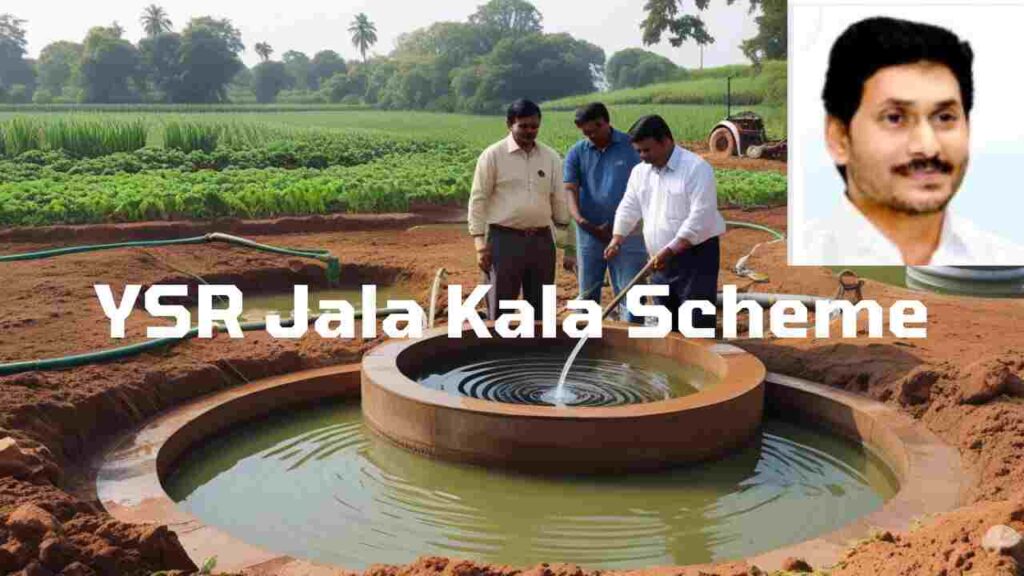
The YSR Jala Kala Scheme represents a notable initiative launched by the government of Andhra Pradesh, led by Chief Minister Y.S. Jagan Mohan Reddy. This scheme is working upon one of the most common problems that farmers face-water scarcity for irrigation purposes. The government has started offering free borewell drilling services to empower farmers and increase agricultural productivity while working towards sustainable water management.
Launched on September 28, 2022, the scheme has become a beacon of hope for countless farmers struggling with drought conditions and high drilling costs. In this article, we’ll delve into the details of the YSR Jala Kala Scheme, covering its objectives, benefits, application process, eligibility criteria, and more.
Highlights of the YSR Jala Kala Scheme
| Feature | Details |
|---|---|
| Name of the Scheme | YSR Jala Kala Scheme |
| Launched By | Andhra Pradesh Government |
| Launch Date | September 28, 2022 |
| Target Audience | Farmers of Andhra Pradesh |
| Primary Benefit | Free borewell drilling services |
| Estimated Budget | ₹2340 crore over 4 years |
| Mode of Application | Online and Offline |
| Official Website | ysrjalakala.ap.gov.in |
Objectives of the YSR Jala Kala Scheme
The prime aim of the YSR Jala Kala Scheme is to support the farmers through resolving water scarcity issues, which cause an obstruction to agricultural productivity. The free borewell drilling service through this scheme is aimed at:
- Increasing Irrigation Facilities: Water supply for agriculture would be available without interruption in drought-prone areas.
- Groundwater Utilization: Facilitate the exploitation of groundwater by farmers.
- Support Marginal and Small Farmers: Provide priority assistance to farmers from economically weaker sections and marginalized communities.
Benefits and Features of the YSR Jala Kala Scheme
The scheme offers a range of benefits that directly impact the agricultural sector:
- Free Borewell Drilling: Farmers receive free-of-cost borewell drilling services to access groundwater for irrigation.
- Wide Reach: Approximately 2 lakh borewells will be drilled over four years, benefiting an estimated 3 lakh farmers.
- Inclusive Approach: The focus is on small and marginal farmers, especially Scheduled Caste (SC), Scheduled Tribes (ST) farmers, and women farmers.
- Budget: The government has made a budgetary provision of ₹2340 crore.
- Application Process: Applications will be scrutinized by the local authorities so that the intended beneficiaries are only eligible to get the benefit.
Eligibility Conditions under the YSR Jala Kala Scheme
To be eligible for these benefits, the farmers have to comply with the following conditions as eligibility criteria:
- Residential: The applicant has to be a resident of Andhra Pradesh.
- Landholding Cultivation: The applicant, or a group of applicants has to hold at least 2.5 acres of cultivable land.
- Presence of Borewell already: The land cannot possess a borewell already.
- Marginalised Farmers: Small and marginal farmers especially from SC, ST and women categories are provided top priority.
Documents Needed
Applicants have to produce following documents to finalize the application:
- Aadhaar Card
- White Ration Card
- Land Passbook with both first and second page
- Residential Proof
- Passport Size Photograph
- Mobile Number
- Caste Certificate (if required)
Steps for Application of YSR Jala Kala Scheme
The government has kept it easy and accessible in two ways, that is both online and offline methods.
Online Application Procedure
- Official website: ysrjalakala.ap.gov.in. (Note: Website is not working)
- Click on the “Apply for Borewell” option.
- Enter your Aadhaar number and the captcha code.
- Verify your Aadhaar-linked mobile number via OTP.
- Fill in the required details, including your name, land details, and contact information.
- Go ahead and submit your application, and don’t forget to jot down that application number for later!
Offline Application Process
- Obtain the application form from the village secretariat or download it from the official website.
- Fill up the form with all the mandatory details and attach all the relevant documents.
- Submit the application form to the concerned office for further processing.
Tracking Application
Applicants can check the status of their application with ease through the official portal:
- Visit the website: ysrjalakala.ap.gov.in.
- Enter your application number in the given space.
- Press the “Track” button to view the status of your application.
Frequently Asked Questions (FAQs)
1Q. What is YSR Jala Kala Scheme?
Ans. The YSR Jala Kala Scheme is a government initiative provided by the Andhra Pradesh government to free borewell drilling services for farmers with their agricultural purposes of irrigation.
2Q. Who are eligible for this scheme?
Ans. Farmers from Andhra Pradesh who possess at least 2.5 acres of cultivable land without an existing borewell in their land.
3Q. How do I apply to this scheme?
Ans. You can apply online through the official website or offline by submitting the application form at the village secretariat.
4Q. What is the total budget allocated for the scheme?
Ans. The government has allocated ₹2340 crore for implementing the scheme over four years.
5Q. When was the scheme launched?
Ans. The YSR Jala Kala Sc heme was launched on September 28, 2022.
6Q. How many farmers will benefit from the scheme?
Ans. The initiative aims to assist around 300,000 farmers in the drilling of 200,000 borewells.
Conclusion
The YSR Jala Kala Scheme reflects the visionary of the Andhra Pradesh government in respect to their intention to empower farmers. Since this scheme can address one of the very critical problems with water scarcity, it also serves to ensure sustainable agricultural production and better water management. Farmers are now all relieved of having a source that can adequately solve irrigation-related problems, ensuring them success in their respective agricultural projects.